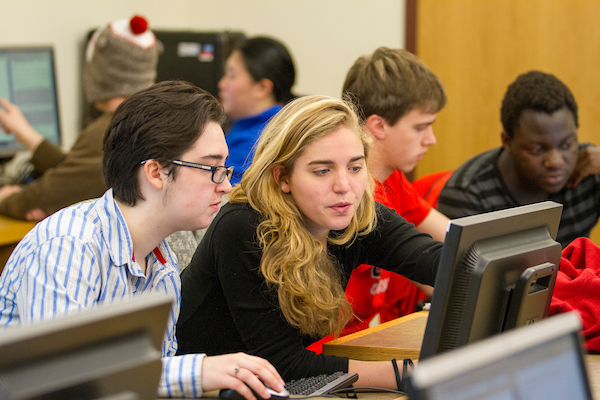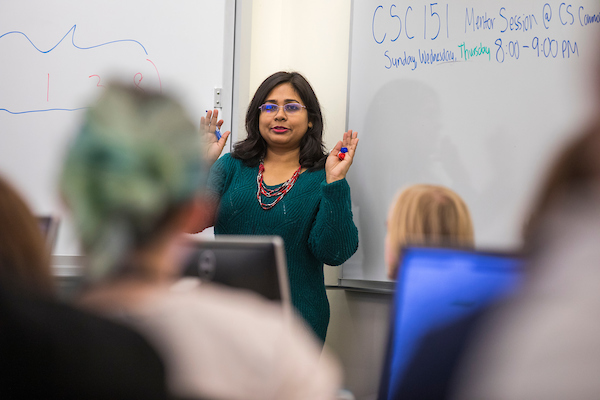practice
Why study computer science?

Interview any group of computing folks, and you will find diverse personalities, interests, priorities, learning styles, and preferences about work environments. Ask these people what brought them to computing, and you will get an equally diverse range of answers. Here are some common responses, categorized into the areas of problem solving, contributions to society, and career options.
Problem Solving

- Computer science requires creativity, insights, background, and skill in problem solving. Each new application, problem, and opportunity presents an new range of problems, and computer scientists enjoy finding solutions. Computing folks thrive on the challenge of solving puzzles.
- Computing problems provide intellectual stimulation. Investigations often start with a high-level vision for a technique or application or system. Creative exploration and analysis takes computer scientists through various levels of abstraction and detail. Eventually, this work results in a working algorithm or system that provides an effective solution.
- Much problem solving in computer science entails a wonderful mixture of theory and practice. The field of computing includes a rich and deep theory that provides a framework for thinking about problems and solutions. In many cases, this theory has direct impact on the development of real systems.
Contributions to Society
- Since computers support so many parts of contemporary society (e.g., in transportation, medicine, engineering, economics, entertainment, technical theater, record keeping, insurance—the list seems endless), work in the computing field provides the opportunity to contribute to many aspects of society. Computing applications have great potential to help address human needs and improve the quality of life.
- Computer science is inherently interdisciplinary. Many computing applications connect computer scientists with professionals in many disciplines. Complex systems draw upon multiple subjects and perspectives, so most computing folk work with a diverse range of people. Long gone are the days when computing was a solitary enterprise. Today, system developers usually work in teams, and work includes extensive personal interactions with clients and colleagues.
-
By its nature, computer science draws on diverse disciplines as part
of the problem-solving process. For example,
Computing Curricula 2001 identifies at least three major "processes" that
come together in computer science.
- Theory uses the mathematical model of deductive reasoning from axioms to logical consequences.
- Abstraction uses the scientific method to collect data, create models of problems and environments, design experiments, and analyze results.
- Design uses the methodology of engineering to clarify requirements of a problem, design and implement solutions, and develop patterns for testing.
Career Possibilities

-
Despite many news reports regarding off shoring, the field of computing has
remarkable potential for long-term careers.
- Within the United States, employment in the IT sector increased 17% from 1999 to 2004—even with all the news of the dot-com difficulties.
- The U.S. Bureau of Labor Statistics projects that computing is the field with the greatest potential for growth through 2014.
- Money Magazine and Salary.com identified "software engineer" at the very top of their listings of the "Best Jobs in America." Further, number 7 on the listing was "computer/IT analysis". In describing the position of software engineer, www.salary.com wrote, "The profession's strong growth prospectives, average pay of $80,500, and potential for creativity put it at the top of the list."
- "According to a January 2006 article on CNN.com, salaries for computing professionals are rising extremely fast. Among the top-ten jobs with the fastest growing salaries, computing represents fully half the list". "Computing Degrees and Careers" by the Association for Computing Machinery (ACM).
